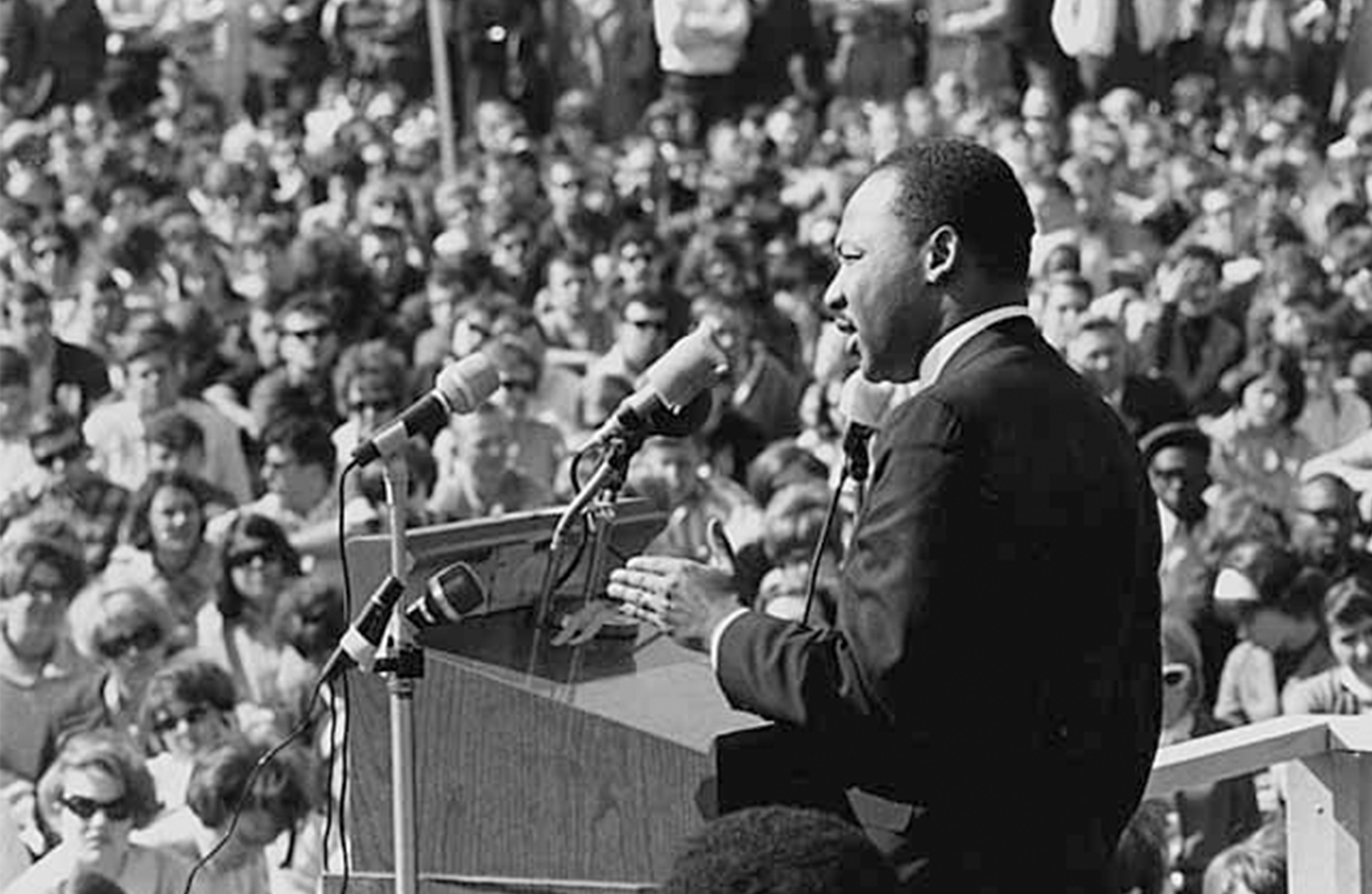Martin Luther King, Jr. speaking against the Vietnam War, St. Paul Campus, University of Minnesota on April 27, 1967 / Minnesota Historical Society / CC BY-SA 2.0
The response from news pundits and social media to the July 13th assassination attempt on Donald Trump was as predictable as it was reactionary and uninformed. In addition to a range of wild conspiracy theories, there were some who claimed it was divine intervention that saved Trump (no explanation of why god would allow the murder of the man sitting behind Trump), and others who regretted that the assassin missed his target.
Wishing Trump harm didn’t feel right to me. I tried to reconcile my own belief in non-violence with the feeling that Trump only reaped what he had sown. “He who lives by the sword, dies by the sword,” Jesus says in Matthew 26. But I also knew that this act of violence could only undermine work towards democracy, peace, and justice. No good can come frompolitical violence.
I reached out to my dear friend Chuck Eaton and asked him how a pacifist should respond.
Chuck reminded me that the answer has been clear for over 2000 years. He reminded me that Dr. Martin Luther King, Jr. had preached about the way to respond to violence many times.
Of course, I thought. I shouldn’t have had to ask.
One of Dr. King’s favorite sermons was on loving your enemies. Dr. King first outlined this sermon around 1952, and he preached on it many times. He published a version of it entitled “Loving Your Enemies” in his 1963 book Strength to Love. Nothing I could write compares to reading his words directly, so I encourage you to read them for yourself. A version of the sermon that was delivered at the Dexter Avenue Baptist Church on November 17, 1957 can be found here: https://tinyurl.com/m5ak8ank
Dr. King based his sermon on the words of Jesus quoted in Matthew 5:43–45:
Ye have heard that it has been said, ‘Thou shalt love thy neighbor, and hate thine enemy.’ But I say unto you, Love your enemies, bless them that curse you, do good to them that hate you, and pray for them that despitefully use you; that ye may be the children of your Father which is in heaven.
The idea of loving our enemies seems so counter to our human nature. It seems to be a position of weakness, not strength. How can love be stronger than violence? How can we possibly love those that wish us harm? Is there ever a time when violence is the appropriate response to violence?
Dr. King believed that violence is never the answer. One of his more famous quotes is from this sermon:
Darkness cannot drive out darkness; only light can do that. Hate cannot drive out hate; only love can do that.
Hate amplifies hate, violence amplifies violence, and toughness multiplies toughness in a descending spiral of destruction.
But Dr. King also said that there is another reason for loving our enemies: Hate also harms the person who hates. Living with hate in our hearts damages us and keeps us from loving others. Hate gets in the way of doing good.
In his sermon, he said:
Love is creative, understanding goodwill for all men. It is the refusal to defeat any individual. When you rise to the level of love, of its great beauty and power, you seek only to defeat evil systems. Individuals who happen to be caught up in that system, you love, but you seek to defeat the system.
Dr. King acknowledged that we don’t have to like someone to love them. Like and love are not the same thing. We can dislike a person who harms us, but we should still love the humanity inherent in everyone. We can hate the systems of oppression that harm millions — systems that result in violence and harm — without hating those who uphold those systems or wishing violence and harm on the perpetrators of that violence.
In the same sermon at Dexter Avenue Baptist Church, Dr. King said there are three ways for the oppressed to respond to oppression. One is to rise up with physical violence and hatred. But he warned that the weakness in this response is in its futility, for violence only leads to more violence and an endless cycle of chaos.
The second response he spoke of is to acquiesce and give in, but he said “that, too, isn’t the way because non-cooperation with evil is as much a moral obligation as is cooperation with good.”
Dr. King then said that the only way left for us to respond is “to organize mass non-violent resistance based on the principle of love … we must discover the power of love … and when we discover that, we will be able to make of this old world a new world …. Love is the only way.”
Wishing harm to Donald Trump is not the way. Giving in is not the way. Working to dismantle systems that lead to violence and harm — systems that favor some at the expense of many, and systems that lead to violence instead of peace — is the way of love. Non-violent resistance is the path to break the cycle.
Let us respond to the words of Dr. Martin Luther King, Jr. by turning away from hate, and instead turning toward a path of non-violent,transformative love.
♥ ♥ ♥
For more of Dr. King’s speeches and writings, I recommend exploring “The Martin Luther King, Jr. Research and Education Institute” website(kinginstitute.stanford.edu) and reading The Radical King, published by Beacon Press.
Ted Miller grew up around the world but now lives in Richland with his wife. He’s a runner, actor, singer, nuclear engineer, and graduate of the U.S. Naval Academy. Ted believes that if more people worked toward love and understanding instead of giving in to fear and divisiveness, the world would be a better place.


